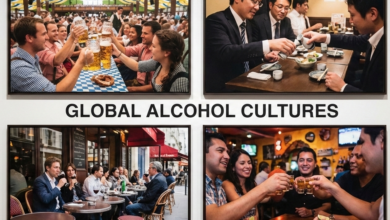Alcohol Culture in Sri Lanka
Sri Lanka, with its vibrant history, diverse landscapes, and rich cultural heritage, has a unique alcohol culture. From traditional toddy tapping in rural villages to the cosmopolitan bars in Colombo. In this article, we’ll delve into the multifaceted world of alcohol in Sri Lanka, exploring its historical roots, consumption patterns, traditional practices, and contemporary trends.
Traditional Beverages: Toddy and Arrack
Toddy, a traditional alcoholic beverage, holds a special place in Sri Lankan culture. It is derived from the sap of palms (Coconut, Kithul and Palmyrah) and has been consumed for centuries. The process of toddy tapping involves skilled climbers scaling tall coconut trees to extract the sap, which is then fermented to produce toddy. This sweet, mildly alcoholic drink is a consumed in many rural communities.
Arrack is an alcoholic liquor made from the distillation of fermented sap of various palm trees, including coconut palm, palmyrah palm, and kithul palm. It’s often enjoyed neat or as a base for cocktails, showcasing the versatility of this local spirit. Some brands of Sri Lankan arrack have gained international acclaim, contributing to the global recognition of the country’s unique alcoholic offerings.
Social Gatherings and Festivals
Alcohol in Sri Lanka is not just about consumption; it plays a central role in social gatherings and celebrations. Festivals, weddings, and other special occasions often feature an array of alcoholic beverages. The sharing of drinks fosters a sense of camaraderie and enhances the festive atmosphere. It is not uncommon to find elaborate bars at weddings, offering a variety of local and international beverages to cater to diverse tastes.
Contemporary Trends: Urbanization and Globalization
As Sri Lanka undergoes rapid urbanization and globalization, the alcohol culture is also evolving. The capital city, Colombo, has seen the emergence of modern bars, pubs, and nightclubs that cater to a cosmopolitan clientele. These establishments offer a wide range of alcoholic beverages, including international brands and craft cocktails, attracting both locals and tourists.
Additionally, the emerging consumer in urban areas is more open to experimenting with different types of alcohol and exploring global trends in mixology. This shift in preferences is contributing to the diversification of the country’s drinking culture, blending traditional practices with contemporary influences.
Alcohol Consumption in Sri Lanka: A Unique Perspective
A study conducted by LMRB Research on consumers in Sri Lanka sheds light on the specific reasons why people in the country choose to consume alcohol. Four primary motivations were identified:
- Escape from Problems (33%): A significant portion of alcohol consumers in Sri Lanka partake in drinking as a means of escaping from life’s difficulties.
- Unwind/Relax (42%): Relaxation is a prevalent motive, with many seeking solace in alcohol to alleviate stress and find tranquility.
- Energize (18%): Some individuals turn to alcohol to energize themselves, possibly seeking a temporary boost in energy or enthusiasm.
- Celebrate (8%): Alcohol continues to be a companion during moments of celebration and festivity.

What’s particularly striking is that the portions for “Escape from Problems” and “Unwind/Relax” combined account for a significant 75% of the reasons behind alcohol consumption in Sri Lanka. This suggests that a substantial number of individuals may be using alcohol as a coping mechanism, finding temporary relief from life’s challenges or stressors.
Challenges and Regulation
Despite the cultural acceptance of alcohol, Sri Lanka faces challenges related to alcohol abuse and its social implications. The government has implemented various regulations to address these issues, including restrictions on advertising, increased taxes, and limited sales hours. While these measures aim to encourage responsible drinking, higher taxes have unintentionally led to increased prices for legal alcoholic products. This affordability gap has resulted in the proliferation of illegal, untaxed alternatives in the market, posing risks to consumer health. Striking a balance between regulation and affordability is crucial for the effectiveness of alcohol-related policies in Sri Lanka.
Furthermore, adhering to the World Health Organization (WHO) principles of school-based education is essential. According to the Global Status Report on Alcohol Policy (2004), WHO provides a comprehensive classification of policy options, including population-based policies. Within this category, School-Based Education is crucial, equipping young people with knowledge and skills to make informed choices regarding alcohol. This aligns with WHO’s emphasis on education to promote public health and prevent harmful consequences of alcohol consumption.
In addition to School-Based Education, Health Promotion Campaigns play a crucial role. Public awareness campaigns educate individuals about the risks of excessive alcohol use and promote responsible drinking. Integrating these campaigns into Sri Lanka’s alcohol policies further enhances efforts to address the challenges associated with alcohol abuse. Balancing education and public awareness with regulatory measures is essential for a comprehensive approach to tackling the social implications of alcohol consumption.

